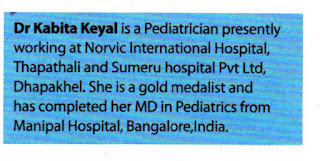HEALTH ask our experts-
Kids ` Health
Q.1 Hello doctor! I have been through
your previous articles and find them
quite interesting and helpful, now since I am a mother of a 7 days old baby boy
who has tooth in his lower jaw since birth, and my doctor says that there is nothing to worry but I still want to
know if I have to do anything for that?
Answer:
Well thanks for reading my articles regularly, Yes I write with an aim to
help out all my readers with some general important topics, now coming to your
cute little boy, even I suggest that there is nothing to worry about it, as
some baby do have tooth at birth, the only thing is that if that tooth is loose
from the gums then there is a chance, that tooth may fall off the gums and baby
may swallow that, so in that case we suggest to remove those loosen tooth but
otherwise there should not be a problem until and unless it hurts your nipple
while breast feeding your baby.
Q.2 Doctor, I run an orphan age home where I have
kids of all ages, and as you know they commonly suffer from diarrhea and some
land up with severe dehydration at times by the time we could consult the
doctor, so please suggest me some danger signs of this disease and some
immediate home management till we can get them a proper medical treatment.
Answer:
First of all, I would like to praise you for the good
human service that you are providing home and shelter to those kids. Well I can
understand but the main cause of diarrhea in these children is lack of proper
hygiene and sanitation, it would be great if you could educate your helpers out
there especially who looks after fooding/ drinking and sanitation part. Now
coming to the queries part, the first and most important is giving ORS/homemade
salt sugar water solution to any child suffering from diarrhea or provide them
with homemade liquids like moong dal-pani, rice kanji, salted lassi, coconut
water, soup. Give ORS every time child passes loose stool. These will prevent
dehydration and will decrease the morbidity. Apart from these there are some
important danger signs you should know in diarrheal diseases or when should you
seek the medical help immediately: like decrease in urine output, Inability to
drink/feed/suck, Increase irritability, lethargy, sunken eyes, depressed
anterior fontanelles , absent tears, dry tongue and mouth.
Q3. Hello doctor! I have been through your
article on immunization in healthy life magazine so thought to ask you my doubt. My child is 5
years old and goes to school, he is been vaccinated with all the regular
government vaccines and some optional
vaccines along with MMR vaccine, but
then I receive a letter from his school
asking for a permission for vaccination
with MR vaccine which is being provided
by the government in free these days and
since my regular doctor is out of town for long could you please suggest on it?
Answer:
Thanks for
the question. I am happy to know that you have updated yourself with
latest information on vaccination and have been immunizing your child
regularly.
Now coming to your queries, it is
not at all necessary to immunize
your child with this MR vaccine if you have completed two doses of MMR vaccine
with your regular doctor. Because
this government MR vaccine is only against Measles and Rubella but the
one you have given as MMR also contains
vaccine against Mumps which is as important as the other vaccines and 2 doses
are given 1 month apart to get its optimal effect. And
you can pass on the message that this vaccine should not be given to a
child who is suffering from fever or
some other acute illness at the time of
vaccination or it is contraindicated in
child who is allergic to egg protein .













